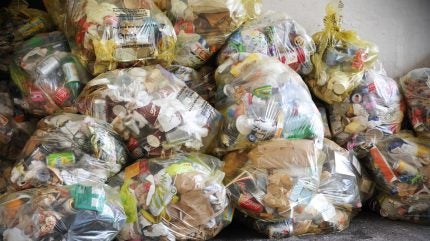
The European Parliament today (9 September) voted for EU measures on food waste that include binding targets for 2030.
The package, initially put forward by the European Commission and then agreed by the EU Council earlier this year, was given the green light by MEPs in Strasbourg.

Discover B2B Marketing That Performs
Combine business intelligence and editorial excellence to reach engaged professionals across 36 leading media platforms.
By the end of 2030, EU member states must cut food waste from food processing and manufacturing by 10% and by 30% per capita from retail, foodservice and households.
The targets are compared to the amount generated as an annual average between 2021 and 2023.
Two years ago, the European Commission put forward plans to make changes to the EU’s Waste Framework Directive (WFD).
According to the Commission, the 58.5 Mt of food waste generated in the EU in 2020 caused emissions of 252 Mt of CO2 equivalents. The emissions represented 16% of the “total greenhouse-gas impact resulting from the EU food system”, Brussels says.

US Tariffs are shifting - will you react or anticipate?
Don’t let policy changes catch you off guard. Stay proactive with real-time data and expert analysis.
By GlobalDataMember states will have 20 months following its entry into force to transpose the rules into national legislation.
Among the UN Sustainable Development Goals (SDG) is a target on food waste, 12.3, which states that, by 2030, countries would “halve per capita global food waste at the retail and consumer levels and reduce food losses along production and supply chains, including post-harvest losses”.
In documents issued by the Commission in 2023 calling for targets in the EU, it said: “Food waste generation is not sufficiently decreasing to make significant progress towards SDG Target 12.3. In the EU, despite the existing legal obligations in the WFD and the supporting activities of the Commission, action taken to date in member states is disparate and has not allowed a significant reduction of food waste levels”.
It added: “The setting of targets is therefore a necessary next step. The specific objectives of this proposal are: firstly, to assign clear responsibility to member states for accelerating reduction of food waste along the food supply chain and in households, in their respective territories, and thus make a solid contribution towards achieving SDG Target 12.3; and, secondly, to ensure sufficient and consistent response by all member states to reduce food waste, in line with that of front-runners.”
Responding to the vote in Strasbourg today, non-profit Zero Waste Europe said it welcomed the measures but said they were “too little, too late”.
In a statement, Zero Waste Europe policy manager Theresa Mörsen said: “In 2015, the EU and its Member States committed to the UN Sustainable Development Goals 12.3, a 50% reduction of food waste across the entire supply chain.
“We now lack decisive action to introduce binding targets, while impacts on climate change, land, and water use become ever more challenging. EU-wide binding targets guarantee fairness among member states and provide clear guidance for food businesses and investors in circular solutions for the years to come. This revision is, unfortunately, a missed opportunity to fully align the food sector with the EU climate goals.”





